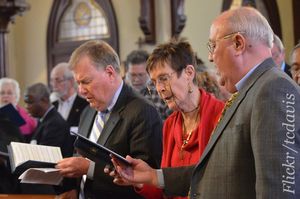‘But when he came to himself, he said ‘How many of my father’s hired servants have bread enough and to spare, and I perish with hunger!’ (Luke 15:17)
Jesus’ parable about the ‘prodigal’ son – who left home and squandered everything his father had given him – addresses circumstances familiar to people of all nations and all times.
Clearly this young man was blessed with a good home, a loving father and many material benefits. But he wanted to ‘spread his wings’, as they say. He wanted to go out on his own and see what the world was like.
He asked his father for his inheritance and set out to find pleasure and happiness.
Fun, friends and pigs
When a person has money, of course, he can also find lots of friends and have lots of fun. The Bible says the youth wasted his possessions with ‘prodigal’ (extravagant) living. He no doubt had a great time – as far as temporary enjoyment is concerned.
His money bought him good things and got him lots of attention. But finally, of course, it ran out. He had to find a job, and a lowly one at that. He had to earn a living feeding pigs.
Clearly the boy had been foolish. Instead of investing his money, or using it to start a business, he had simply thrown it away.
But, to his credit, he suddenly awoke from his mental and moral stupor. As he sat and watched the pigs eating one day, he realised how hungry he was.
He would willingly have shared their feeding trough. But desperate though he was, no one gave him anything.

Amid his poverty, filth and hunger, he began to think. The Bible says, ‘he came to himself’; that is, for a change, he began to think sensibly. His father’s labourers were better off than he was!
He decided to go back home, apologise to his father and seek his help. In a spiritual sense, we need to do the same thing. We need to return to God – and spiritual sanity.
The folly of sin
What is involved in coming back to spiritual sanity? Several things.
Firstly, returning to spiritual sanity means recognising the folly of sin. The youth of Jesus’ parable had not been wise, and he now knew it.
Because of a famine in the land, he ‘began to be in want’ (v.14). The money his father had given him would have stood him in good stead at this point, but he had thrown it all away in his ‘big fling’.
Had he stayed at home and helped in the family business, he could have lived in comfort and plenty. But now the prodigal was poor and hungry, grinding out a living feeding someone else’s livestock.
What a powerful picture this is of the one who lives away from God – away from the teaching of the Bible and the church; away from the counsels of a godly home. In broad terms, we all have been at this point at one time or another.
Isaiah 53:6 puts it very plainly: ‘All we like sheep have gone astray. We have turned every one to his own way; and the Lord has laid on him [Christ] the iniquity of us all’.

There you have it. In one way or another, every one of us has ‘gone astray’ from God. We have not loved him as we should. We have broken his laws and pursued our own self-centred way.
In order to be turned around – or converted – a person has to realise that a life of sin and rebellion against God is wrong and foolish. He has to be honest with himself.
Decision
The second element of returning to spiritual sanity is to determine to change.
A man must look his situation squarely in the face and say, ‘I have been stupid. I have wasted my life. I have broken God’s laws and squandered my opportunities. Now I must change.
‘I must turn around and go back to the Lord’. That is when a person begins to display spiritual sanity.
The wayward youth of our story had become keenly aware of his sorry condition – he said, ‘I perish with hunger’. He knew that he could not go on – without proper nourishment and care, he was going to die.
So he began to think about the warmth and comfort of his home. He thought how even the servants, at that very moment, were enjoying the plenty of his father’s house.
He made a decision. He must go back. ‘I will arise and go to my father’, he said (v.18).
Repentance
Here we see a change of attitude – the Bible calls it ‘repentance’ – a firm resolve to make changes in his life.
The young man in our story has woken up to his terrible condition and is determined to do something about it. He decides to quit his wasteful, hopeless way of life and return home.
Something similar must happen to the sinner. He must resolve to set things right, to come to the Lord with true humility and repentance.

The Bible tells us that to become Christians we must repent of our sins. Jesus, John the Baptist, and the apostles all preached ‘repentance toward God and faith toward our Lord Jesus Christ’.
To repent means to change ones’ mind and admit it. You can see throughout the Bible that repentance is the mark of a person in whom the Spirit of God has truly worked.
When a sinner repents, he feels genuinely sorry for the way he has grieved the heart of God, his Creator and benefactor.
However, we cannot do this by our own volition or moral strength. The Bible makes it clear that repentance must be received as a gift from God (Acts 5:31; 11:18). It takes God’s grace to produce in us this change of attitude.
Confession
Thirdly, spiritual sanity means a willingness to confess wrongdoing.
The wayward boy was not only determined to forsake his former ways, but to humbly admit his wrong.
The prodigal rehearses exactly what he will say to his father: ‘I will arise and go to my father, and I will say to him, “Father, I have sinned against heaven and before you, and I am no longer worthy to be called your son. Make me like one of your hired servants”‘ (vv. 18-19).
He was willing to humble himself before the good and gracious father he had offended. He had felt the sting of guilt, and was now ready to confess his sin openly.
What a powerful picture this is. It shows us that it is not enough to have a guilty conscience. We must come to the place where we plainly and frankly confess our sins to God.
This is not only true at the beginning of the Christian life – at conversion – but also on a daily basis thereafter. Believers must confess their sins continually, for they will then receive continual pardon through the blood of Jesus (1 John 1:6-9).
Forgiveness
Finally, spiritual sanity involves accepting free forgiveness.
As the prodigal returns to his father’s house, repenting and confessing his sin, everything is set right. His father ‘saw him and had compassion, and ran and fell on his neck and kissed him’ (Luke 15:20).
What a picture of the love of God this is! Clearly the father here represents almighty God, against whom we all have sinned. The prodigal’s father does not turn away from his wayward son, nor is he reluctant to forgive. Immediately, freely and joyfully, he embraces his once-lost son – and restores him to his former place.
Let us be clear. God is ready and willing to forgive anyone who seeks his forgiveness. God’s arms are outstretched to every wayward soul who desires to be reconciled to him. He is much more ready to forgive than we are to repent.
But there is one condition. We must accept God’s forgiveness as a free unmerited gift. In the words of the well-loved hymn:
Nothing in my hand I bring
Simply to your cross I cling;
Naked, come to you for dress;
Helpless, look to you for grace;
Foul, I to the fountain fly;
Wash me Saviour, or I die.
We come to God only through the work and merits of his Son, Jesus Christ – who died to bear our sins upon the cross and rose from the dead to declare us justified. We shall be turned away if we try to plead our own merits – for in truth we have none to offer.
The gospel is all about God’s willingness to reconcile helpless sinners to himself, sinners who see their need of him. In fact, the whole story of redemption is about God taking the initiative and doing all that is necessary for us to be restored.
The apostle John puts it this way: ‘In this is love, not that we loved God, but that he loved us and sent his Son to be the propitiation for our sins’ (1 John 4:10).





















